Owning a rental property comes with a lot of responsibilities. One of these is to ensure that everyone within the premises of your rental unit gets to live in peace. However, even though you screen your tenants carefully and ensure that they have a good background and were not involved in any issues with their past neighbors, complaints from neighbors are still a possibility.
One of the most common complaints that you might receive about your tenants is related to noise. Sometimes, tenants can get a bit boisterous—and this can upset the neighbors. Sometimes, this will result in complaints being directed to a building manager, HOA member, or worse, a police officer.
As a landlord, noise complaints are a common issue that you should know how to handle. Dealing with noise complaints can sometimes be a source of stress, but if you know the laws related to this issue, then there’s no need to get overwhelmed.
Here are the steps that you should take if you receive a complaint regarding tenants’ noise:
Step 1: Assess the Complaint
Before taking any action, make sure to assess how valid and severe the complaint is. It’s best to check with your city’s jurisdiction if there is a maximum limit on the level of noise decibels. This way, you will know if the tenants exceed the maximum level, helping you decide on how to go about dealing with the complaint.

It’s important to figure out the nature of the noise complaint before you confront the tenant. Sometimes, noise complaints are from unreasonable neighbors who aren’t understanding or considerate.
Also, there’s a possibility that your tenants may not be the cause of the noise. It’s also recommended to ask other neighbors (aside from the complainant) if they also notice the noise and if it’s bothering them as well.
Step 2: Determine What Triggers a Noise Complaint
In general, tenants have the freedom to live their lives in the rental unit. Sometimes, this can result in making noise to a certain extent, because noise is a normal part of living. When dealing with a noise complaint, it’s essential to find out what triggers it in the first place to know what action to take. Here are some reasons that may cause noise within the area of your rental property:
Arguments
Arguments among the members of a household are quite common. Sometimes, disagreements may lead to occasional screaming and crying. However, if there is constant fighting among household members that result in loud screaming almost every night, the landlord needs to take reasonable action.
Parties
Tenants may be allowed to throw occasional parties and dinners with guests. Typically, these can cause some noise. But when maintained within reasonable levels, they are not really worthy of complaints.
However, if tenants are having regular parties or gatherings that cause excessive noise at unreasonable hours that deliberately disturb the neighbor’s right to peace and quiet enjoyment, the landlord needs to take disciplinary action.

Pets
If your property is pet-friendly, you can anticipate certain noises that are caused by pets. However, if your tenants’ dogs are barking constantly almost all day and all night long, neighbors have the right to file a complaint.
In general, dogs don’t bark for no reason. If this issue has been going on for quite some time, it’s best to talk to your tenants and ask if their dogs are all right. You may need to reinforce your policy about controlling their pets to prevent unnecessary noise.
On the other hand, if your property has a no-pet policy, and yet you receive a noise complaint regarding pet-related noise, you need to investigate the situation and take necessary action. This is a clear violation of the terms of the lease and may be grounds for eviction. Check the state’s landlord-tenant law and local ordinances to know how to handle this situation.
Loud Footsteps
If someone is renting a unit in a multi-level building, hearing footsteps is quite common. However, if tenants are jumping or dancing around in the middle of the night, the neighbor has the right to file a complaint.
Loud Music and/or TV
Another common reason for a complaint is loud noises from televisions or loud music. Check if your tenants use a surround-sound speaker for late-night movies and make sure to remind them to keep the sound to a reasonable level so they don’t distract the neighbors.

Step 3: Determine if the Complaint Is Valid or Not
If the complaint is valid, take action in accordance with the severity of the problem. If the offense only happened one time, a warning should suffice. If the issue is happening frequently, make sure to send a warning and request the tenants make a concerted effort to minimize their noise. However, if the tenants don’t change their behavior, you may need to take legal action and consider evicting the tenant.
If the complaint is not valid, you have to let the neighbor who issued the complaint know why you think the complaint is invalid or unreasonable. If the culprit for the noise is not your tenant, ask help from your tenant to identify the source of the noise. Either way, you have to update the neighbor that the complaint is not valid after a proper investigation.
How to Avoid Noise-Related Complaints
The best way to avoid noise-related complaints from neighbors is to include a clause in your lease that prevents tenants from making unnecessary and unreasonable noise. Making the terms clear in your rental agreement can help protect you in the future should this issue arise. You can also take legal action if the tenant violates the term of the lease.

Conclusion
If you receive a complaint about noise, make sure to investigate the situation properly before taking any action. Failure to do so may risk harming your relationship with your tenants and/or neighbors.
Before taking any action, make sure that you stay in compliance with the terms of the lease agreement and more importantly, the law. For help with managing tenant relationships and handling your responsibilities as a property owner in Arizona, contact Taylor Street Property Management!


